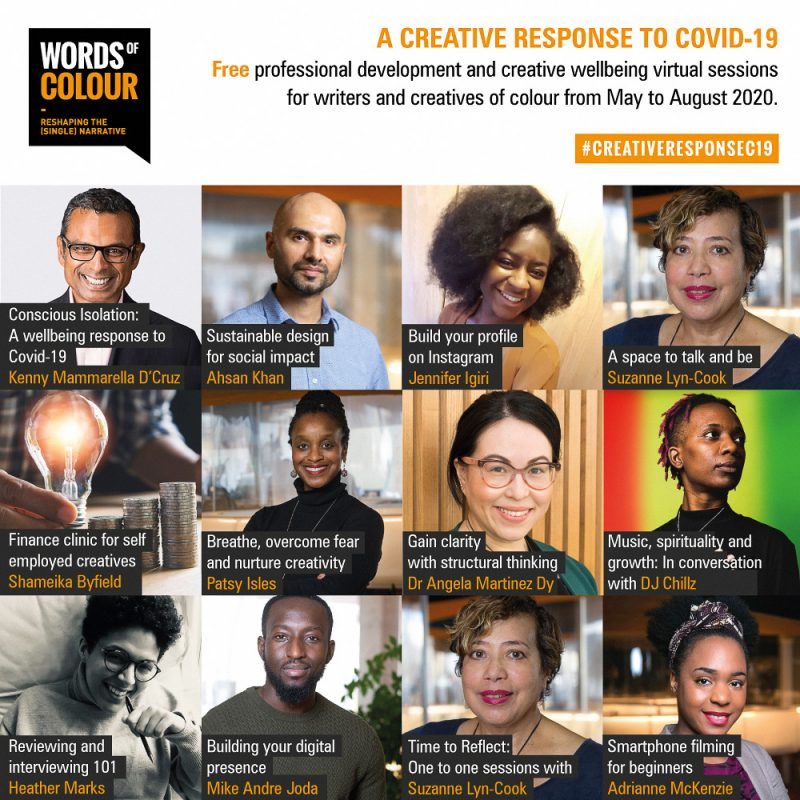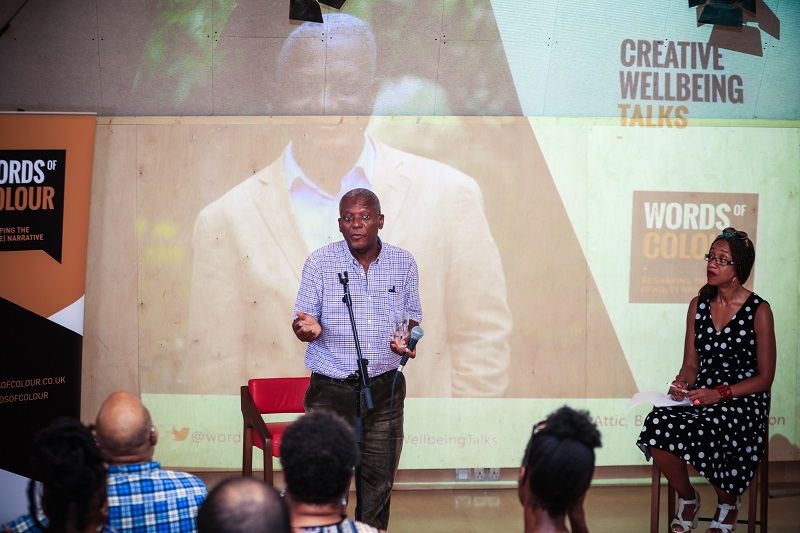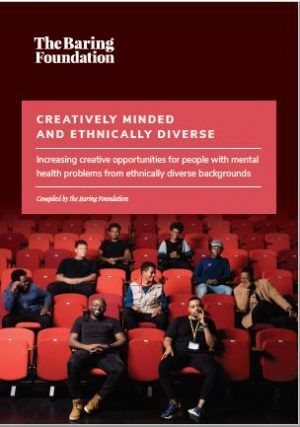Words of Colour is preoccupied with making social impact by disrupting narratives that do not serve the artistic and mental wellbeing of writers, artists and creatives of colour.
Joy’s article was originally published in our report Creatively Minded and Ethnically Diverse. Photo of Joy © Alan J McFarlane.
In The Guardian on the 10th February 2018, award-winning Black British actor Daniel Kaluuya (Get Out, Black Panther) revealed: “I’m not reading so many essays [about race] for fun; I’m reading them because I need to know how to articulate myself in certain situations, and I feel very alone in certain spaces. And I feel weird, and I have to have a word map, and the armour. I know about race for armour. I don’t know about race to make myself feel good.”
Daniel’s words and experience painfully encapsulate why Words of Colour Productions, a creative development agency that facilitates and develops writers of colour, of all genres, has been developing inclusive models of creative wellbeing (which incorporate artists of colour’s individual experience of engaging with colonised, white and middle class institutions), and creative entrepreneurship (to bridge the knowledge and experiential gap between the arts, culture and enterprise).
The ‘spaces’ Daniel refers to are creative spaces. In theatres. On film sets. In rehearsal rooms. Spaces where the last thing he needs to be concerned with, as a successful artist, is race and racism. Instead, to shore up his sense of self, safety and mental wellbeing, he has to. Sadly, he is not alone.
This reality begs several questions. How can the arts be truly participatory when the sector struggles to tackle its colonial-imprint to be truly inclusive amid accusations and evidence of systemic racism? Can creative institutions be entrusted with the mental wellbeing of the artists of colour they commission within this reality? How are they proactively engaging artists of colour with lived experience of mental health? And are they ready to accept how this predicament can, and does, make people of colour ill?
These assertions are not rooted in fiction. In 2018, the Synergi Collaborative Centre, a partnership between the University of Manchester, the University of Oxford and Words of Colour Productions, produced a well-received briefing paper entitled The impact of racism on mental health.
The paper reveals a ‘growing body of robust evidence demonstrating that racism leads to mental illnesses, especially depression and prolonged periods of adjustment’, such as extended grief. It also states that ‘there is evidence that racism also has an effect on physical health, for example, high blood pressure’.
Compelling evidence […] shows that racism is a form of stressor, both in its more overt forms and as micro-aggressions. With regards to interpersonal racism, the paper draws attention to ‘compelling evidence which shows that racism is a form of stressor, both in its more overt forms and as micro-aggressions’.
This includes situations where there is an awareness of ‘being treated and responded to in a less than fair way on the basis of race; perhaps even being feared, avoided or especially disadvantaged’.
This is framed sharply against the disproportionate impact of Covid-19 on people of colour, based on a ‘triple whammy of threats’ to their mental health, incomes and life expectancy, the traumatic public murder of George Floyd and the global Black Lives Matter movement. All of which inspired a number of industry-focused campaigns, including #PublishingPaidMe, which highlights the stark disparities in how black and white writers are paid, and the creation of the Black Writers’ Guild, calling on all major publishing houses in the UK to introduce sweeping reforms to make the overwhelmingly white industry more inclusive – at all levels.
In June 2020, we co-curated the four-day digital launch of Rethinking ‘Diversity’ in Publishing, the first in-depth study in the UK on diversity in trade fiction, authored by Dr Anamik Saha and Dr Sandra van Lente, in partnership with Spread the Word and The Bookseller. The report found that assumptions about audiences being white and middle-class still prevail; that publishers continue to see writers of colour as a ‘commercial risk’; and that Black, Asian and minority ethnic and working-class audiences are undervalued by publishers, economically and culturally, impacting on the acquisition, promotion and selling of writers of colour.
Many of the challenges facing writers of colour are structural, but have been exacerbated by the pandemic.
Professor Sunny Singh
The ramifications of these findings are not lost on award winning author, literary academic, activist and co-founder of the Jhalak Prize Professor Sunny Singh, who says: “Many of the challenges facing writers of colour are structural, but have been exacerbated by the pandemic”, as highlighted by the Pop-Up September 2020 author survey.
She explains that the Jhalak Prize exists “specifically in response to these marginalisations, diminishments and exclusions which impact on the overall wellbeing and mental health of writers of colour. Writers of colour are typically paid significantly less in advances and royalties, even by major publishing houses, leading to greater precarity of income and personal life than our white peers”.
Singh’s own mental health and physical wellbeing has been impacted by running the Jhalak Prize for writers of colour, now in its fifth year. She explains: “The initial announcement to establish the prize was greeted by multiple literary figures with snide remarks and racialised attacks in person, and in the press, about how the prize was to compensate for a lack of literary merit among writers of colour, despite evidence to the contrary”.
The stress and strain have adversely impacted my creative output. In setting up an initiative for our community of writers of colour, I fear I have made myself a target of hostility of the industry and that my writing may be penalised for my outspokenness on issues of equality. Professor Sunny Singh
In response to the worrying number of black and brown people dying from Covid-19, we were compelled to curate and launch our Creative Response to Covid-19 for writers and creatives of colour. Unfunded, this rapid response was possible due to us quietly championing inclusive models of creative wellbeing and creative entrepreneurship for four years with yogi, writer and Creative Wellbeing Coach Patsy Isles and Personal Development Consultant Kenny Mammarella D’Cruz, with input from Executive Coach and Interfaith Minister Jackee Holder, and poet, publisher and educator Jacob Sam-La Rose.
From May, with an extension to September 2020, our culturally diverse and multidisciplinary team ran a range of free, creative wellbeing and creative entrepreneurship virtual workshops. These included topics such as ‘Conscious Isolation’ and ‘Structural Thinking’ and hosting a Finance Surgery for self-employed creatives on legal structures in the new climate, alongside one-to-one sessions and group sessions as part of our ‘A Space to Talk and Be’ series with our Director of Creative Wellbeing and People Suzanne Lyn-Cook, a qualified Psychosynthesis Practitioner, which was over-subscribed.

The programme attracted practising and aspiring artists of colour and cultural leaders, at all levels. Mental health and wellbeing were consistent themes. The fear of putting their stories, work – and themselves – into all white spaces and/or anticipating racial hostility were among the concerns aired and shared, some based on real experience.
Stories also filtered through of artists of colour, at the intersection of race, disability, gender identity and faith, having R&D money withdrawn or, as arts practitioners, being dismissed, released or repositioned within their organisations as the BLM expert. History was repeating itself under Covid-19.
Manchester-based poet, dramaturg and theatre-maker, Naomi Sumner Chan, is the founder of Brush Stroke Order, which champions new writing. Having spent over 10 years working in participatory theatre and community engagement, she is worried about how artists of colour are being impacted. “Historically they haven’t been well supported by mainstream organisations and have had to fight for opportunities and bear the weight of being ‘the only one in the room’,” she says. “Artists of colour continue to be pitted against each other for limited opportunities. I fear this competition will be even more fierce post-Covid with money and resources at an all-time low.”
Artists of colour continue to be pitted against each other for limited opportunities. I fear this competition will be even more fierce post-Covid with money and resources at an all-time low.
Naomi Sumner Chan
Although some mainstream cultural organisations are finally taking race and representation more seriously, Sumner Chan believes that “the emotional labour is falling on the few people of colour within organisations who are tasked with delivering various initiatives and having difficult conversations on top of their actual job. They get burnt out but feel the pressure to carry on or nothing will change”.
Despite these challenges, it is also a time of great creativity, collaboration and transformation. In June 2020, we partnered with the innovative month-long Breathe 8.46 campaign, led by BlkOut_UK and Survivors UK. Artists and creative organisations were invited to curate a digital activity for London-based black men to take time out to heal from the impact of racism in memory of George Floyd. Our Creative Wellbeing Associate Patsy Isles produced ‘Breathe and Be’, an 8 minute 46 second mindfulness exercise.
In this unsettled and often unpredictable climate, Words of Colour is preoccupied with making social impact by disrupting narratives that do not serve the artistic and mental wellbeing of writers, artists and creatives of colour. We are committed to creating alternative spaces, online and offline, to foster counter-experiences and counter-narratives that are nourishing, inspiring and facilitate truth telling in a safe way with room for divergence.
An essential part of this work is to co-create a new language and to reframe existing terminology that often guides the commissioning of artists of colour, and the participatory arts, and how we are described (from BME to BAME).
An essential part of this work is to co-create a new language and to reframe existing terminology that often guides the commissioning of artists of colour, and the participatory arts, and how we are described (from BME to BAME). This is critical as the lens that filters much of this process is based on a language created without us in the room, at a time when many black and brown people were owned, oppressed or othered. A reality that still prevails and is flawed, elitist and problematic.
Award-winning filmmaker Campbell X (Stud Life) understands this all too well regarding the mental health of black and of colour trans people, especially the way they are positioned, referred to or ignored in the arts and entertainment industries.
He says: “Trans people are treated in a cavalier way culturally by being excluded from conversations with regard to their genders. We are pigeonholed into ‘trans’ and not seen as the genders we are, either men, women, or non-binary. Until we change our thinking around this centring of cis people as default, we will maintain the structures laid down by white supremacist ways of thinking around gender. This way of thinking has nothing to do with one’s skin colour or ethnicity but is a product of our colonised education.”
Our commitment to reframing the single narrative has inspired us to launch a creative wellbeing and entrepreneurship hub by the summer of 2021. Conceived as an idea in 2016, it was piloted in 2018-2019. This included the launch of our knowledge-exchange space Creative Wellbeing Talks series at Bush Theatre with leading Psychoanalytic Psychotherapist Frank Lowe (Tavistock Centre) as our inaugural guest speaker.

We have explored concepts, practice and packages with a range of committed creative, arts and entrepreneurial organisations and academics, including our longstanding academic partner Dr Angela Martinez Dy (Loughborough University London), Becky Swain, Director of Manchester Poetry Library, award-winning independent publisher Jacaranda Books, Arvon, Jerwood Arts and Kiln Theatre.
We are also collaborating with artists such as Booker Prize winning novelist Bernardine Evaristo (Girl, Woman, Other), award-winning novelist and activist Derek Owusu (That Reminds Me, Safe: On Black British Men Reclaiming Space) and award-winning novelist and writer Alex Wheatle MBE, Sir Steve McQueen (Small Axe (BBC1), Crongton Knights series) and psychodynamic therapists.
We are part of a growing ecosystem of black artists who are creating alternative pathways, including in the poetry arena. Poet and theatre-maker Nick Makoha recently launched the Obsidian Foundation, a one-week retreat for black poets of African descent, for them to self-express, “free from racism” with mentors such as Roger Robinson, winner of the TS Eliot Prize 2019 and Ondaatje Prize 2020 for his collection A Portable Paradise.
Robinson has spoken of his experience as a black poet in the literature space and is an advocate for ‘radical vulnerability’, where black artists express their vulnerability and lived experience in a radical way to counter the true self being hidden or hiding for survival. A concept he has given us permission to develop.
He says: “I’ve gone to places and worn glasses to seem less aggressive than they think I am. There is a devaluation of Black British writers. It’s about doing socially engaged work like Linton Kwesi Johnson did in his time. It is important for people, especially black men, to see me practice extreme vulnerability. Writing poetry helps me with empathy. Literature helps me with empathy.”
Renaissance One, which furthers the art of poetry, literature and the spoken word and is a collaborator, is another black-led organisation that is curating wellbeing programmes for artists of colour, spearheaded by its Director Melanie Abrahams. Most recently its Care Project, a national initiative connected with artists through mentoring, socials and salons.
Despite the richness of this burgeoning landscape, we need to excavate and expose the casualties of racism from their historic engagement in the arts. Those who had to operate in what acclaimed African American ballet dancer Misty Copeland describes as a ‘white atmosphere’, which negatively impacted their mental health, leading them to prematurely abandon their calling to preserve their wellbeing.
Cultural Management Consultant and Founder/Director of the Museum of Colour Samenua Sesher OBE, advocates for arts funders and organisations to develop an increased understanding that “difference is an advantage”. She continues: “They need to ask and listen and pay for coaching and support for staff. Our sector is riddled with insecurity for everyone, but the pressures of a hostile workplace, especially one that does not understand itself to be one, are significant.”
We all have a part to play in changing the single narrative that drives much of the arts – and mental health agenda. But the real conversations need to begin within arts and culture institutions, about themselves, their poor progress and their proposed actions for change, with boldness and honesty. This is a journey of collective responsibility which requires collaboration, national leadership and ownership.
We have started working with organisations who straddle mental health, psychodynamic and literary spaces, who are mindful of the traumatic outcome of the pandemic and George Floyd on black and brown people and are ready to rethink (and reframe) how they lead, develop their teams, support their constituencies and communities of colour, and be anti-racist organisations.
It is early days, but in 2021 we intend to be part of a healthier and more informed space expressing a bold, empathetic and inclusive narrative. I hope you are ready to make that critical shift – wherever you are.
Joy Francis is Executive Director of Words of Colour Productions, a creative development agency that promotes, facilitates and develops writers of colour, of all genres, and collaborates and co-creates with arts, creative, writing and entrepreneurial industries to increase cultural inclusion for social impact. She is also Co-Director of the Lankelly Chase-funded Synergi Collaborative Centre which seeks to eradicate ethnic inequalities in severe mental illness through championing systems change, new science, creative inclusion, collaborative leadership and co-creation.
